This week in the UK, George Galloway was elected to parliament with a landslide victory in a by-election in Rochdale. On its face, these results are quite remarkable: Galloway finished with almost double the number of votes of his closest rival, an independent who received little media attention, and both soundly defeated the Labour and Conservative candidates.
This was of such concern to the British establishment that Prime Minister Rishi Sunak gave an address from 10 Downing Street to warn the country of “extremists undermining democracy”. Sunak specifically identified Islamism and far-right extremism as the forces seeking to undermine “the world's most successful multi-ethnic multi-faith democracy”.
I’m no PR guru, but I’m not sure how wise it is to respond to a landslide election victory by saying it undermines democracy. The subtext of this speech was that Galloway had won by appealing to the Muslim population of Rochdale — who make up 30% of the constituency — over their outrage at the war on Gaza.
Voices of official Britain have spent the days since complaining about the “sectarian” and “divisive” nature of Galloway’s campaign, apparently concerned it would further this sectarianism and division to come out and say what they actually mean.
Writing for Unherd, Ralph Leonard spelled out the concern more clearly
Despite making a few milquetoast local pledges — bringing back a maternity hospital and a Primark to “make Rochdale great again” — Galloway’s single-issue campaign was clearly targeted towards Rochdale’s Muslim population that comprise 30% of its population.
Outside mosques, he campaigned for votes by appealing to the consciences of worshippers. Could they face God on “judgement day” and say they opposed Keir Starmer and the Labour party’s position on the Gaza crisis when they had the chance? He won a by-election in Bradford West in 2012 with a rather similar strategy, where he beat Labour by portraying himself as a champion of oppressed Kashmiri Muslims.
One interesting aspect of Galloway’s campaign is he produced different election material to appeal to Muslim and White voters. While his appeal to natives focused on family, patriotism and law and order (specifically promising to target grooming gangs), his appeal to Muslims asked they protest Labour’s complicity on the slaughter in Gaza by electing someone with a long track record of standing up for Palestine and Muslims worldwide.
Despite his leftist bona fides, Galloway is one of the last of an older breed of British socialists, and it’s interesting to read his appeal to White voters still taps into family values, rejection of trans ideology, and British patriotism.
Galloway has always been a masterful politician, and his instinct to appeal to White voters on these issues rather than typical left-wing appeals was very wise. This strategy was a success, and for official Britain, this is a worrying sign of something terrible stirring under the feet of the establishment: identity politics. Leonard writes
For most politicians, it has become rote to affirm modern Britain as a multicultural success story. But in reality, in a place like Rochdale, this multiculturalism isn’t a cosmopolitan paradise, but really what Amartya Sen called “plural monoculturalism”. Here different groups live apart with little contact with each other or any sense of shared social space.
This magnifies ethnic divisions and degenerates politics into nothing more than championing tribal grievances at the cost of enacting a broader social vision for the benefit of all. And while it is doubtful that there will be explicitly Islamic parties like in Germany, or a BNP-style party based on white majoritarian resentment seizing power any time soon, it is the logical endpoint of this ethnic identitarianism.
While at first it may seem hysterical for the establishment to respond as aggressively as it has to Galloway’s win, in a sense they are correct. In the long run, identity is stronger than ideology. The Gaza war has shown that Muslims in the West still hold great affinity for their brothers in the Middle East, and will be activated politically for their causes. After decades of multiculturalism, Muslims still care more about their issues than any of the domestic policies which will be the topic of debate for the upcoming general election.
The truth is, immigrant groups have always voted in their own interest. They support maintaining open immigration policies, opposing the expression of ethno-nationalism, and engage in all sorts of lobbying efforts for their particular group. The establishment is fine with this, because their desired system is liberal mass democracy, and a diversity of minoritarian groups lobbying on behalf of their own rights while helping to police the public square from outbreaks of populism representing the majority national group maintains the stability of that system.
The difference now, though, is that two of these minoritarian groups — Jews and Muslims — are at odds over the question of support for Israel, there is nothing the Jewish lobby can do to win over most Muslims or White leftists, and that the British government remain totally committed to Zionism. On this one issue, the state’s desired social engineering project reached a limit in the identity of Muslims. It would make political sense for the establishment parties to abandon their slavish support for Israel — a country committing the greatest televised slaughter in history and engaging in ethnic cleansing — but each is subservient to the Israel lobby.
Part of the reason for Galloway’s wide-margin victory was that the Labour Party withdrew support for its candidate, a Muslim named Azhar Ali, after he made comments they considered antisemitic, blaming “people in the media from certain Jewish quarters”, and stating that Israel desires to ethnically cleanse Gaza.
Yet even after Galloway rides a wave of Muslim anger to victory, the establishment still seems more concerned about “the far-right” and a potential outbreak of native ethno-nationalism. In a piece cautioning against writing off Galloway, The Guardian reminded its readers that “alienated white voters were a key part of Galloway’s winning coalition.” Sunak focused as much on the far-right as Islamism in his speech, and on the same day, Sam Melia was sentenced to two years in prison for sharing stickers.
The stickers shared by Melia included phrases like “It’s ok to be White” and “Love Your Nation”. In one of the most disturbing trials of its kind yet, the judge told the jury that whether the statements were true or themselves legal was irrelevant, what mattered was Melias’s intent. In sentencing Melia, the judge invoked rising antisemitism and said the sentence was intended to serve as a deterrent to people thinking of peddling a similar message. Muslim identity politics may be a concern, but the establishment still fears the arrival of native identity politics over all else.
This is especially true for the Conservative Party, who appear to be on course for a catastrophic result at the next general election: a defeat big enough to potentially finish the party as a serious electoral force.
It seems like the main reason is that after decades of betrayal – especially on immigration – their voters have finally just stopped caring for the "at least they're not as bad as the left" excuse.
Years of uninterrupted Tory rule brought record high immigration, even after Brexit. It also brought gay marriage, trans treatment for children and all the rest of the LGBT agenda, aggressive censorship and draconian policing of dissent, and full-throated support for the Ukraine war. Seeing a conservative party play out their agenda exactly how they want is apparently the best way to turn right-wing voters against them.
Conservative parties in the West draw their key base of support from older natives who typically rate immigration, law and order, and national sovereignty as top concerns. All these issues are implicitly identitarian, and many of these voters do see these parties as the most nationalist option, or at least the option most likely to deliver something for these nationalist concerns. But these parties are not identitarian, and regularly betray voters on these issues, in large part because they take the support of this demographic for granted, especially in a country like the UK where the only viable electoral alternative has been the Labour party.
Given this dynamic, it’s little wonder that the authors of How Democracies Die concluded that a strong center-right party is crucial to keeping radicals excluded from the mainstream of politics. These political scientists warn that one of the major developments which facilitated the rise in popularity of the Nazi party was the German center-right falling prey to infighting in the early 1930s. They hold up the CDU, the German conservative party which has been the major force in German politics since the end of the Second World War, as a major reason for the impressive stability of Germany’s liberal democracy. The brand of politics of the CDU is the same formula as most European Conservative parties post-war, and across Europe the trend is their support drastically waning among younger voters.
Observe the fall in support among younger voters for the dominant conservative force in Poland, PIS, and look at how support for the nationalist Konfederacja increases among younger voters:
We see a very similar trend in France:
And in the UK, but with no identitarian alternative:
There seems to be a trend with young people in the West: they are more left-wing than their parents and grandparents, but the right-wing ones are drawn to nationalism rather than conservatism.
Combine this trend with the complete electoral collapse of a dominant conservative party, extreme alienation of working class white people, other ethnic groups more openly engaging in identity politics, and immigration ranking as a top issue among right-wing voters, and you have what seems like a huge gap for a nationalist breakthrough. Currently, one of the main things preventing this is the extreme repression of nationalists by the state, as demonstrated by the case of Sam Melia.
So the establishment does have reason to be concerned. Identity politics in a multiracial society may be like a contagion: once candidates get elected openly appealing to one group and its interests, the other groups are going to start asking why they’re not doing the same. Ideological politics are a luxury: debate about the right level of income tax or the size of the military only mean something when there’s a shared sense of a national interest. As soon as identity politics become a reality, ideology takes a backseat.
George Galloway appealed to two very different demographics in Rochdale, but he succeeded by recognising their politics as an expression of their specific concerns around their identity, and targeting these concerns, he brushed aside the two behemoths of British politics. There will be future Galloways who only target one side of that equation — Muslims angry at Zionist influence over the UK government, or dispossessed White voters angry at the effects of multiculturalism — and they too will have success.
As I see it, both developments are positive. Politicians appealing to alienated working class White voters — as did the Brexit campaign and Trump ‘16 — will activate them as a source of populism, while non-white immigrant groups abandoning traditional political coalitions to more explicitly assert their particular interests will force the question of identity on native voters.
It’s a reminder that for all the promises of multiculturalism, we remain distinct peoples with distinct interests. Little wonder then, that the most loyal defenders of multicultural pluralism are ringing alarm bells.


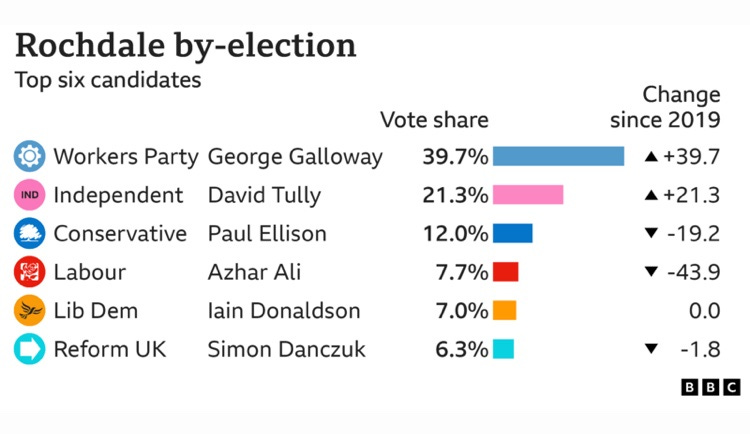
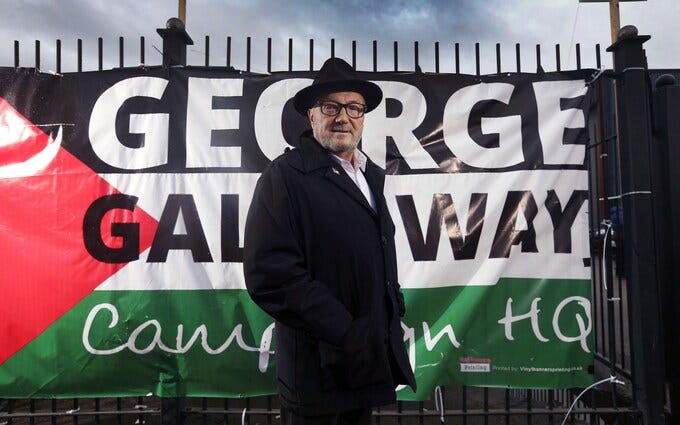
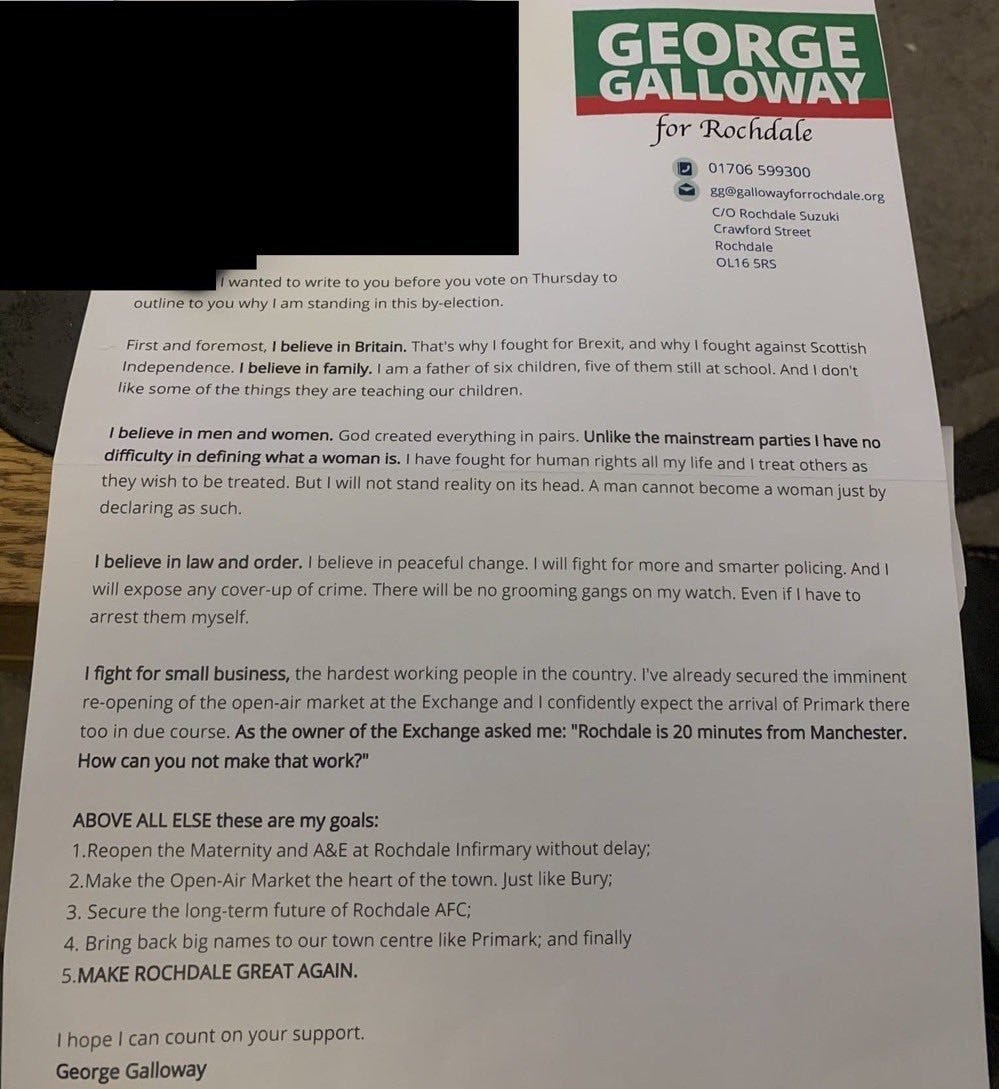
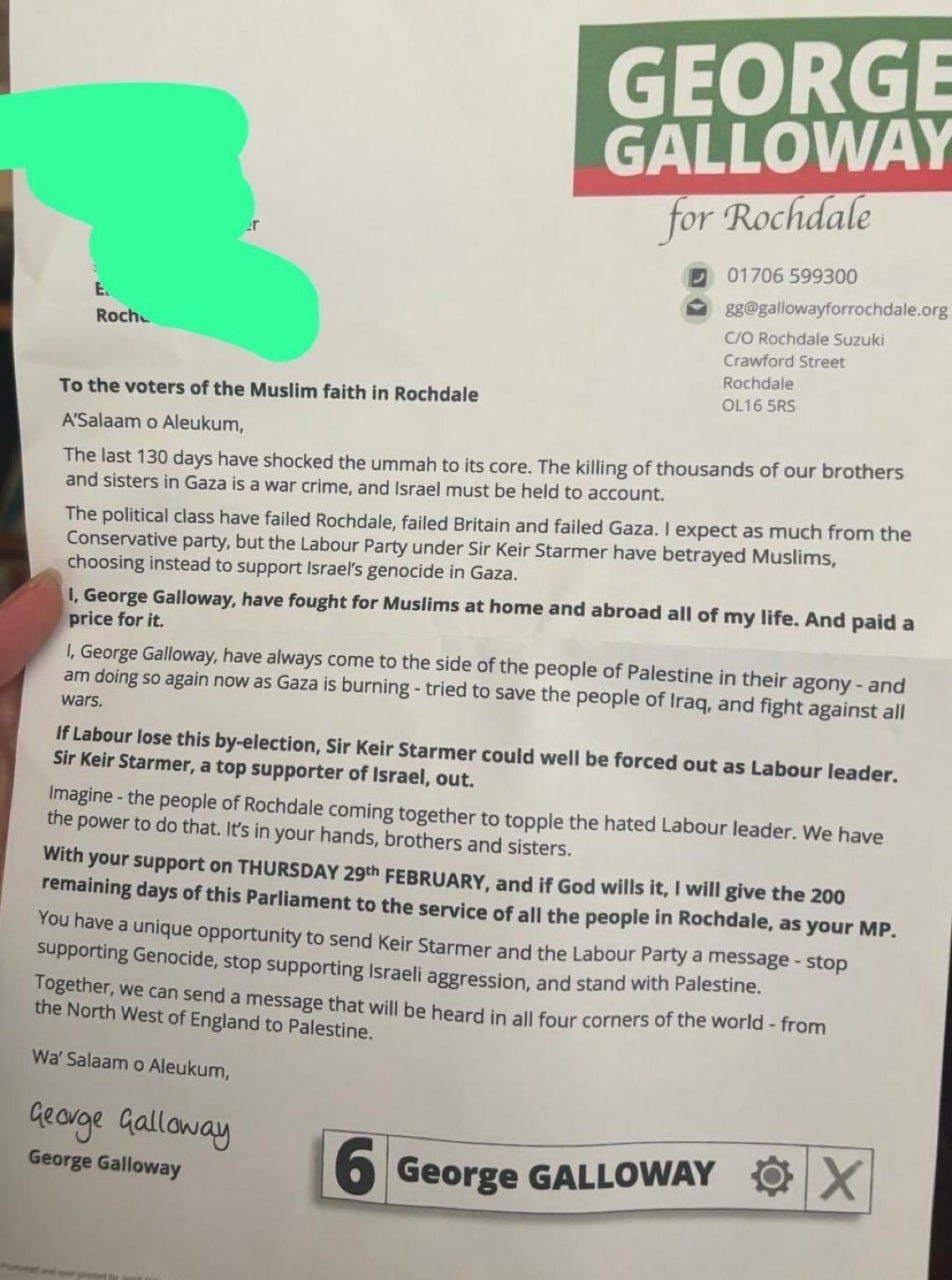
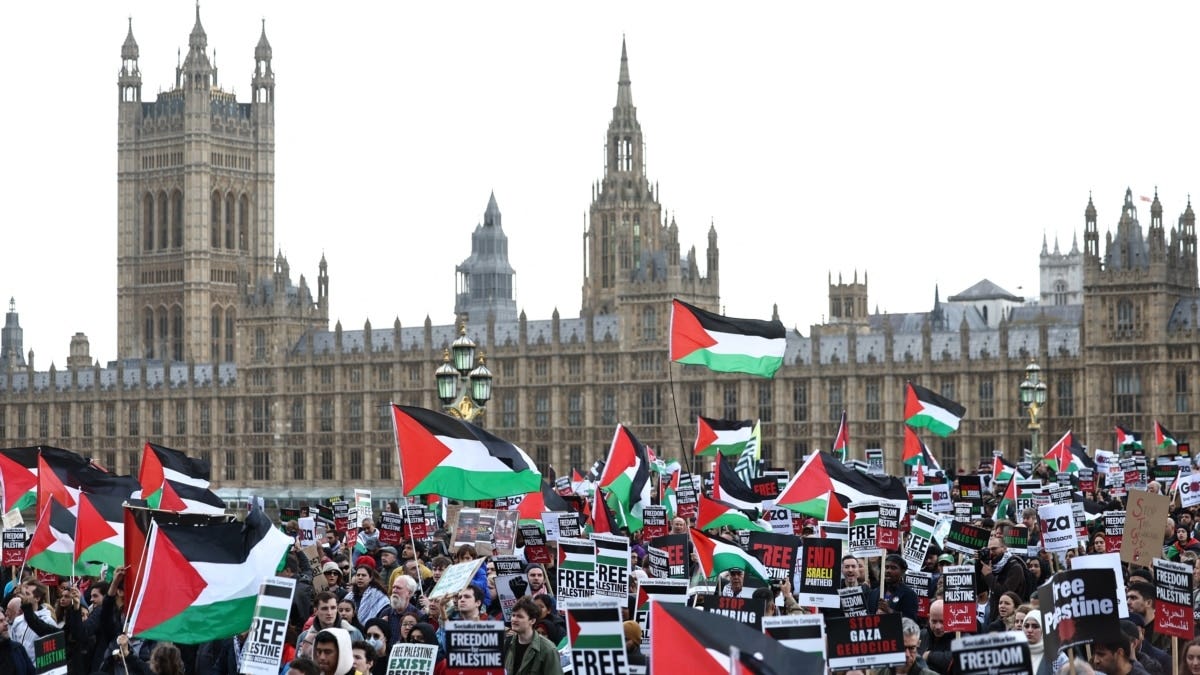

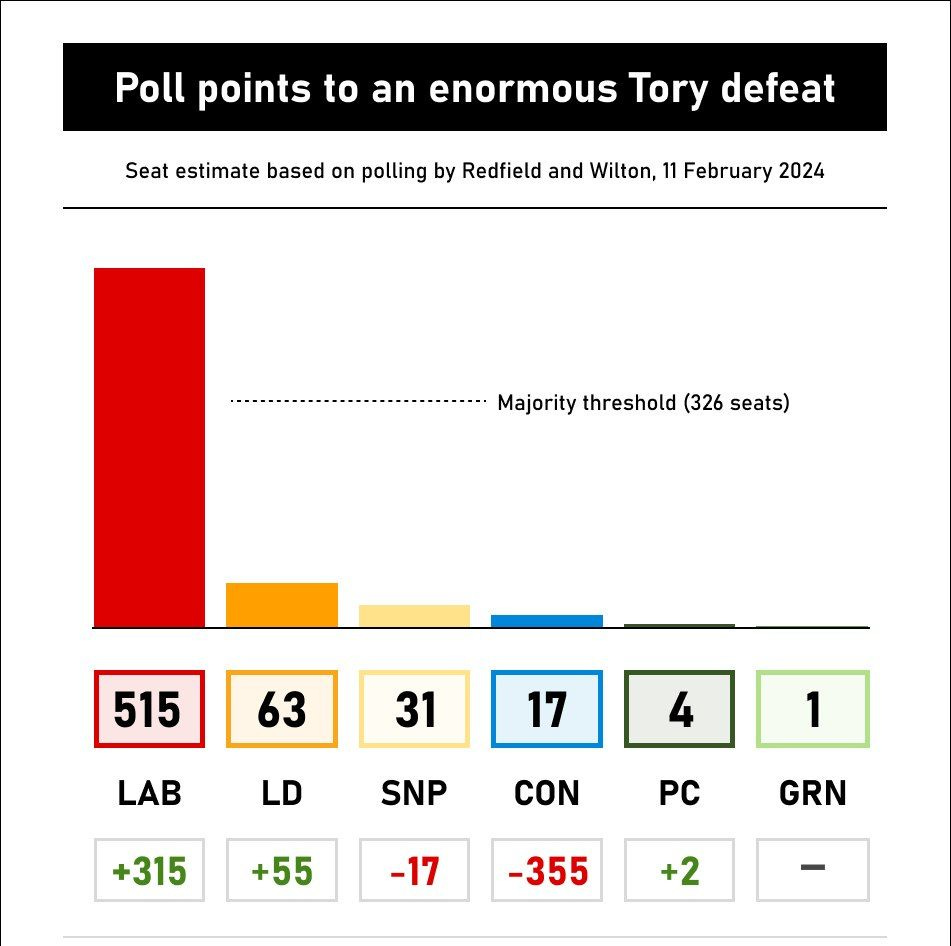
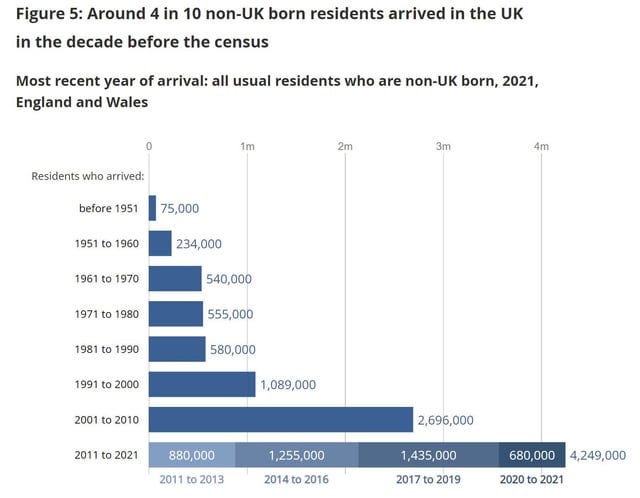
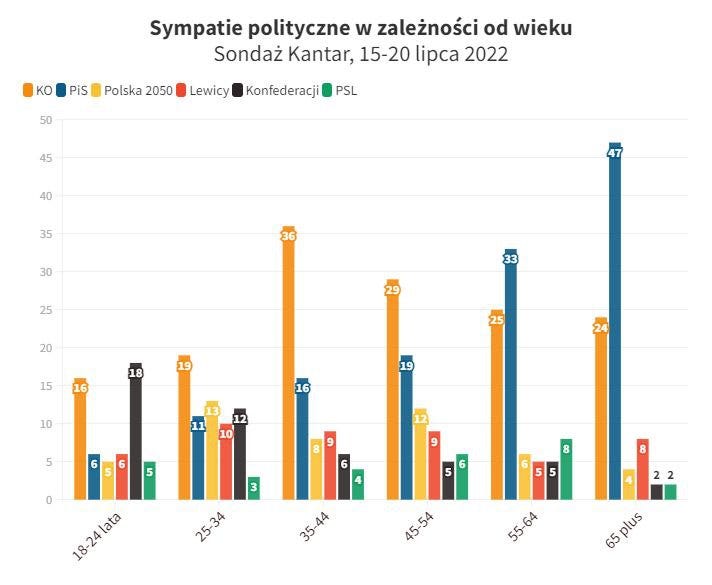

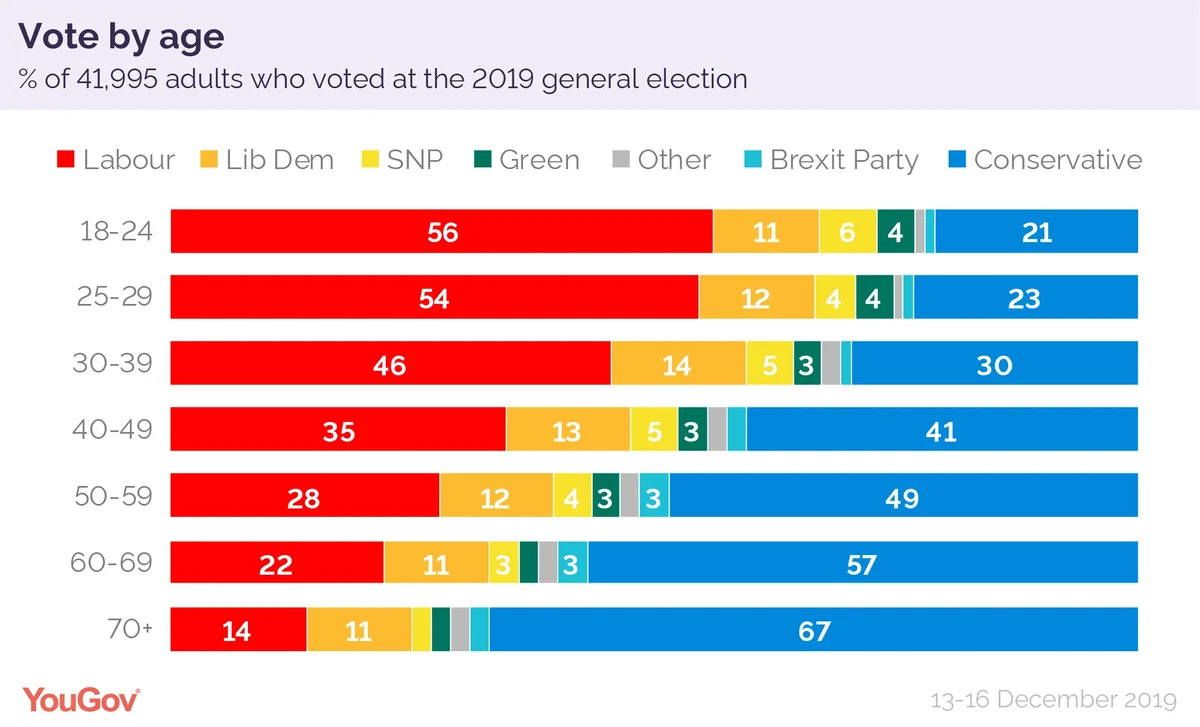
Good to see Mark Collett set up a fund for Sam's pregnant Wife and child. People can also help the family at this time buy buying tea and coffee from their family online biz GRANDMA TOWLER'S.
A very good, sober analysis of what Galloway's election means for the future of British politics. Galloway isn't one of "our guys", but he clearly understands that different groups have different concerns which are related to their identities. The rhetoric employed by Sunak, to the effect that we all share "common values", rings hollow when you see the constant ethnic and religious conflict going on in the UK, whether it's Hindus against Muslims, Muslims against Jews, everyone against Whites, etc.